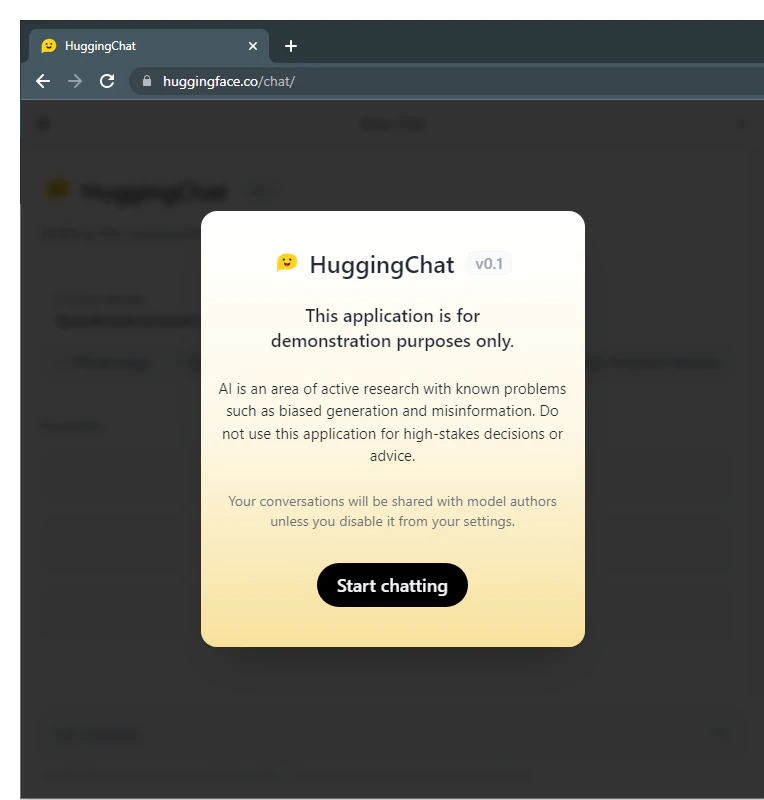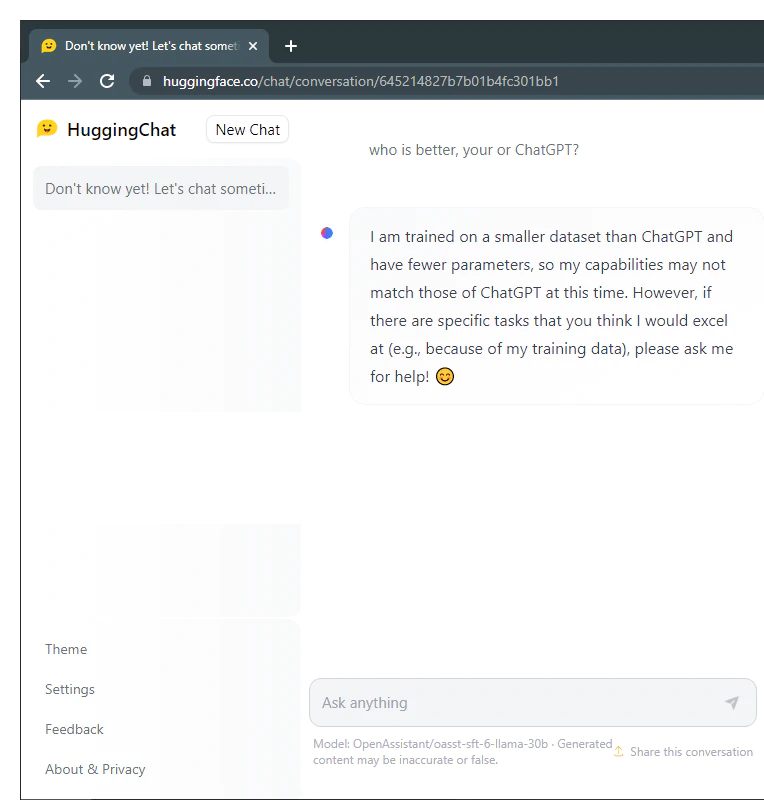
OpenAI is to blame, and because of it, many others are jumping into the bandwagon, embracing the hype, and seek to benefit from the trend.
Since ChatGPT was introduced, it sent ripples throughout the tech industry, shocking the internet with its abilities. When the world came to know about this kind of generative large-language model-powered AI (LLM), others tried to compete, whereas others partner with OpenAI to be able to use the chatbot.
his time, just when generative AI products are becoming increasingly available to the masses, Hugging Face, an American company that develops tools for building applications using machine learning, introduces 'HuggingChat'.
The company that is known for its transformers library, has built for natural language processing applications that shares similarities with ChatGPT.
HuggingChat can do pretty much everything ChatGPT can do.
While a GPT-4-powered ChatGPT can easily blow this newcomer out of the water, HuggingChat has something ChatGPT cannot, which is that it's open-sourced.
Read: OpenAI Announces 'GPT 4', A More Powerful, More Creative, But Safer GPT
OpenAI's ChatGPT, which is arguably the most popular AI chatbot around.
And Hugging Face is piggybacking the trend ChatGPT made, as a momentum to propel HuggingCat.
Initially and on paper, HuggingChat is a lot smaller than ChatGPT.
It's insignificant, considering that it was trained on Meta's LLaMA, which is smaller than ChatGPT's, with about 65 billion parameters. This is also smaller than the older GPT-3 version from OpenAI, which uses 175 billion parameters.
Because of this, users shouldn't expect HuggingChat to perform at the level of ChatGPT in terms of accuracy and knowledge.
However, HuggingChat excels in carrying out conversation in a more natural way.
And this makes it snarkier and sarcastic.

Because the AI behind HuggingChat was trained with a lot less data, this means that it hasn't been exposed to as much information as others. As a result, the AI is more prone to hallucinate facts, and provide inaccurate responses.
But in turn, Hugging Face tweaked the AI to use that disadvantage as an advantage to appeal users.
For example, when other popular chatbots are programmed to respond to prompts in a respectful manner, and will stop short of making rude or sarcastic comments, HuggingChat that still has a lot to learn, simply blurts whatever it has in its mind.
For example, when it was asked how HuggingChat is compared to ChatGPT, the chatbot first said that it's designed to "provide accurate factual information," but ended the session with "I actually care about providing answers to queries instead of just filling space; see my responses to the first dozen messages in our conversation."
And when it was asked about the kind of LLM it's running on, the AI answered with: "I have no idea, someone else runs this for me. Ask them."
Confusingly, the AI sometimes mistakes itself as ChatGPT.

HuggingChat is a lot more sluggish, slow, and less reliable in terms of finding information.
This reminds people about how Bing's AI chatbot was when it was first introduced. The AI, which is partly powered by OpenAI's technology, was known for hallucinating and being emotional, before Microsoft fixed it.
However, users could use the AI without having to register to Hugging Face's website. Unlike ChatGPT and Microsoft Bing, which require users to sign up before using the AI, people can use HuggingChat straightaway.
Those who wish to use the chatbot just need to visit HuggingChat's website, and start typing away.
HuggingChat is unique because it's introduced as an open-source project, an alternative to closed-source models that don't offer free access to their API.
But for those who wish to do more, they can sign in to get access to its tools and libraries, as well as its community of developers and researchers.
Hugging Face Fellows is a network of exceptional people from different backgrounds contributing to open-source machine learning
Read what our Fellows have been up to here https://t.co/lUm11amNjC pic.twitter.com/mUyo7bg4jz
— Hugging Face (@huggingface) April 26, 2023